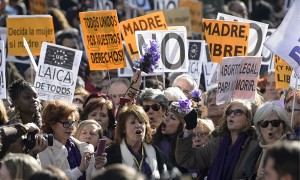
Birthright and Need: the Politics of Belonging
by Lucinda Kirk | March 23, 2017
In a world of Trump, Brexit and Marine Le Pen, national identity is key to making sense of people’s choices. A law passed by the Spanish government in June 2015 allowed anyone with genealogical proof of being related to a victim of the 1478 Spanish Inquisition is entitled to dual Spanish citizenship, without even living in Spain. Being of both Sephardic and Ashkenazi Jewish descent, this caught my attention; my Jewish ancestors lived in Seville during this tumultuous period. From childhood I have been told stories of my Jewish ancestors who, refusing to convert to Christianity, were forced to flee from the Iberian Peninsula and become refugees. The Spanish government justified the law as an attempt to rectify the persecutions of the 15th century; a form of “historic rehabilitation”. They claimed that the new relationship between Spaniards and Jews would pave the way for a modern, more tolerant Spain. But what are the implications of essentially giving back an identity which my ancestors were stripped of 500 years ago? Today, we witness in horror Muslim-Americans in the US being denied entry into their own country, on account of their religion alone. While we cannot guess at how this will escalate, I wonder whether the US will be contritely handing passports to Muslims in half a century? The years that separate me and my ancestors are perhaps an example of how governments can be so slow in changing, that reconcilement is no longer possible. The law challenges increasingly popular notions of belonging to only one country; it sees us as part of an international community.
Historically, Sephardic Jews have been no strangers to persecution: the Alhambra Decree of 1492 (more commonly known as the Edict of Expulsion) saw Isabella and Ferdinand of Spain order the expulsion of practising Jews from Castile and Aragon. The couple feared they would “subvert their holy Catholic faith and draw faithful Christians away from their beliefs”. Though 200,000 Jews did, in fact, convert to Catholicism, tens of thousands more were forced to leave—those who didn’t were punished by a summary execution, while those who sheltered Jews were stripped of their belongings and privileges. Torture by the notorious Spanish Inquisition involved strangling, dislocation of limbs and being burnt at the stake. I know that this would have been the fate of my ancestors had they refused to emigrate. Their peaceful religion was cited as justification for stripping these citizens of their nationality and forcing them out of a country which they called home.
Only 4000 Sephardic Jews have received the citizenship since the new law was passed, a low figure considering the global Sephardic Jewish population is 3.5 million. Recently, however, interest in the measure has soared, with tens of thousands now in the process of applying after the Brexit vote. The question remains as to how far being in possession of a nation’s passport in fact renders us true citizens of that country. If I were to apply for Spanish citizenship now, would it feel like a new start, or would it become a disposable identity, akin to a document brought out if I feel like a trip to Ibiza? Surely, national identity, unlike legal citizenship, is not something that can be ticked off a list or granted in the form of paperwork. It’s a personal and individual social concept, related to the sense of belonging and integration—something I am unlikely to feel from across the channel. Not only is there the issue of linguistic separation, but also the fact that Spain, after all, tortured and murdered members of my ethnic group. Perhaps it would be shameful to jump at this politically advantageous opportunity and completely disregard a history of extensive persecution.
The post-Brexit citizenship application boom shows that, for many, there is little or no inherent patriotic value attached to a passport; it seems many are prepared to exchange their nationality for material advantages. My own wish to obtain a Spanish passport is not rooted in an enthusiastic desire to return to the homeland of my ancestors or from a strong cultural pull; I have visited only once. Instead, I think of the potential for travel and work that might disappear in a post-Brexit Britain. Adopting a national identity is a political and pragmatic transaction. Often, it is borne out of desperation. In 2016, Spain agreed to welcome 15,000 Syrian refugees—surely, the safety and security of refugees, fleeing war and political corruption, should take priority over those who already have a form of valid citizenship? Not only would awarding a Syrian asylum seeker a Spanish passport provide them with political and social protection, but there would be legal implications: they could find work in countries within the European Union and have free movement into 175 countries worldwide, a privilege which many Sephardic Jews already have.
The parallels between the situation of modern refugees and that of my own ancestors 500 years ago makes me question who ought to be prioritised. We live in a society where we are taught to be driven towards our own gain. The potential for personal success and security that the dual citizenship offers comes up against abstract notions of national identity and political priorities. I ask myself whether it would be shortsighted to overlook this opportunity; after all I am entitled to it. But perhaps in this I am subscribing to a paradigm of belonging that is the same one that lead to the suffering of my ancestors, and those who experience prejudice today. Belonging should be predicated not only on ancestral rights, but on need.
Photo credit: flickr




